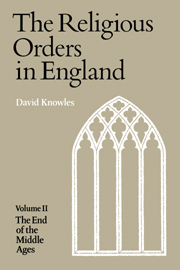Book contents
- Frontmatter
- Contents
- Preface
- List of Abbreviations
- Part One The Historical Framework
- Chap. I The opening of the period
- Chap. II Monks and canons at the university, 130c–1450
- Chap. III Patrons and architects: Ely and Gloucester
- Chap. IV Portraits of monks
- Chap. V Monks and friars in controversy
- Chap. VI Trends in speculation: Ockhamism, justification and grace
- Chap. VII Criticism of the religious in the fourteenth century
- Chap. VIII The spiritual life of the fourteenth century
- Chap. IX Developments within the orders: I
- Chap. X Developments within the orders: II
- Chap. XI The fortunes of the Cluniac houses and the alien priories
- Chap. XII The loosening of discipline
- Chap. XIII King Henry V
- Chap. XIV More portraits of monks
- Chap. XV The second century of visitation, 1350–1450
- Chap. XVI The spiritual life of the fifteenth century
- Part Two The Institutional Background
- Appendix I Chaucer's monk
- Appendix II Henry V and the Westminster recluse
- Appendix III Regulars as bishops
- Bibliography
- Index
Chap. V - Monks and friars in controversy
Published online by Cambridge University Press: 28 January 2010
- Frontmatter
- Contents
- Preface
- List of Abbreviations
- Part One The Historical Framework
- Chap. I The opening of the period
- Chap. II Monks and canons at the university, 130c–1450
- Chap. III Patrons and architects: Ely and Gloucester
- Chap. IV Portraits of monks
- Chap. V Monks and friars in controversy
- Chap. VI Trends in speculation: Ockhamism, justification and grace
- Chap. VII Criticism of the religious in the fourteenth century
- Chap. VIII The spiritual life of the fourteenth century
- Chap. IX Developments within the orders: I
- Chap. X Developments within the orders: II
- Chap. XI The fortunes of the Cluniac houses and the alien priories
- Chap. XII The loosening of discipline
- Chap. XIII King Henry V
- Chap. XIV More portraits of monks
- Chap. XV The second century of visitation, 1350–1450
- Chap. XVI The spiritual life of the fifteenth century
- Part Two The Institutional Background
- Appendix I Chaucer's monk
- Appendix II Henry V and the Westminster recluse
- Appendix III Regulars as bishops
- Bibliography
- Index
Summary
DOMINION AND GRACE
It is a characteristic of the century that elapsed between the death of Aquinas and the outbreak of the Great Schism that both thinkers and leaders of parties followed out their ideas or their principles of action to what seemed their logical issue but what was in fact a point outside the sphere—beyond the horizon, so to say—of a world of human beings and practical relationships: to a point, that is to say, where logic becomes fallacious and harmful. The extreme papalist writers, the no less extreme secularists, the Franciscan advocates of the Poverty of Christ, though especially notable, are but examples of this general tendency. No less striking in their intransigence are the various leaders on either side of the controversy on Lordship and Grace.
The theory of Lordship or Dominion and Grace first became a living issue in the worlds of thought and politics with the appearance in 1302 of the work De ecclesiastica potestate of the Austin friar Giles of Rome. In this treatise, which is throughout an assertion of papal claims in their most extreme form, Giles maintained that dominion can only exist within the Church or with the permission of the Church, and that in fact only faithful Christians can have just dominion since they alone can derive their right through the Church from Christ the supreme Lord of all things. The basis of this position consists of the two propositions that only the just are susceptible of God's gift of dominion, and that only those in a state of grace within the Church are truly just.
- Type
- Chapter
- Information
- Religious Orders Vol 2 , pp. 61 - 73Publisher: Cambridge University PressPrint publication year: 1979



